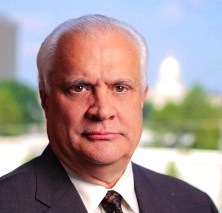Technology specialists identify trends to watch in 2018
by January 9, 2018 2:25 pm 1,072 views

The impact of machine learning, virtual reality, big data and the Internet of things will continue to expand in 2018 for Arkansas businesses, said Michael Paladino, chief technology officer at the software development company RevUnit in Bentonville.
Tech-watchers also can add quantum computing and blockchain to the list of innovations with potential to have widespread influence moving forward, he said.
“It’s an amazing time to get to be in the technology space as so many technologies like artificial intelligence, augmented and virtual reality and quantum computing are growing exponentially,” Paladino said. “2018 will see many of these emerging technologies move into mainstream usage while others continue to incubate.”
• Artificial intelligence (AI)
AI has gotten a lot of attention in recent years as a game-changer, both in business and the day-to-day lives of consumers. Now, AI tools have become increasingly available to software developers as ready-made API (application programming interface) to integrate into their products. AI technology is now widely accessible through free, open-source sites as well as through paid offerings from Microsoft, Google, IBM and Amazon.
“These libraries and APIs are allowing developers to add intelligence to all aspects of their applications,” Paladino said.
This means the technology has the potential to become much more pervasive in 2018 and will be used in an increasing diversity of applications, as new consumer products are developed and as businesses find uses for the technology and the problem-solving and efficiency it can provide.
“Tasks like automatically categorizing images or turning large, unstructured documents into meaningful data are becoming easier to do and no longer require the monumental efforts they did previously,” Paladino said.

Varun Grover, David D. Glass Endowed Chair and Distinguished Professor of Information Systems at the University of Arkansas Sam M. Walton College of Business in Fayetteville, agreed on the importance of AI in terms of shaping innovation in 2018.
“Algorithms, or bots, that can analyze data, find patterns, target consumers [or] automate processes are going to become more prominent,” Grover said.
• Data analytics
The harnessing and use of data is also something to keep an eye on, said Tom Chilton, director of science and technology for the Arkansas Economic Development Commission.
“The watch words for business in 2018 are data analytics and emerging data science,” Chilton said. “Several emerging companies in Arkansas are developing new and advanced analytics applications with intensive use of artificial intelligence models, while working with the state in training for the use of the above mentioned tools and product development. This training includes cyber security best practices, skills development in the use of analytics, and new software development.”
The commission provides tax incentives and grants tied to that training.
Along that same vein of data, cloud application also is driving new innovation in Arkansas, Chilton said, “especially in regard to storing large databases and making them useful and easily-accessible.
“Through the use of data analytics, companies will be able to produce new productions and new utilities to provide the business community market-saving information insights,” he said.
• Internet of things
IoT was cited by Chilton and Grover as a trend to watch in 2018. IoT is a network of physical devices and objects embedded with technology that enables them to capture and transmit digital information or to be remote-controlled by a mobile device or computer.

“The Internet of things is a revolution that just started,” Grover said.
Though the term IoT was coined near the turn of the 21st century, and consumers have had access to smart appliances, smart cars and related products for several years, projections show the IoT realm is poised for a big growth spurt.
An estimated 34 billion devices could be connected to the Internet by 2020, according to research from Business Insider’s research arm, BI Intelligence. IoT devices could account for 24 billion – up from 10 billion in 2015 – while traditional computing devices like smartphones, tablets and smartwatches, would comprise 10 billion. Grover said IoT will become increasingly influential across a wide range of industries moving forward.
“I think businesses will have to think more broadly about their product in terms of how they can increase its capability with IT (information technology), even physical products like refrigerators, as well as the broader product platform or ecosystem. So, the locus of competition continues to change,” he said.
Chilton said Arkansas officials now provide assistance in the growth of young startup companies through multiple accelerator programs in several different industries including fin tech, cyber security and healthcare.
“These companies are developing new applications in banking and finance with the use of the Internet of things applications and the use of AI to apply for mortgages and other banking products,” Chilton said.
• Voice-controlled virtual assistants
A 2016 Pew Research survey showed nearly half (46%) of U.S. adults used voice-controlled digital assistants, and Paladino said adoption of the trend should continue to spread in 2018.

Apple’s voice-controlled speaker device the HomePod is supposed to launch early this year, while similar products from Amazon and Google, the Echo Dot and Google Home, respectively, were top-selling products this past holiday season.
“As consumers get more comfortable interacting with voice assistants at home, they’ll begin to expect the same types of experiences elsewhere,” Paladino said. “Conversational interfaces that allow customers to interact with businesses will continue to grow. Even inside businesses, employees are increasingly looking to interact with their software systems via natural language and voice.”
• Augmented reality and virtual reality
Paladino also said there will be more widespread, real-world use of AR and VR moving forward, and its use continues to go far beyond the entertainment element.
“While Apple’s ARKit and Google’s AR Stickers are fun ways for consumers to get exposure to augmented reality on their phones, the application for education and on-the-job training can be huge,” Paladino said. “Walmart has already used VR as a tool to train associates on hard-to-replicate experiences like Black Friday.”
• Blockchain
Blockchain, a method of recording events or transactions on an encrypted ledger, has been noted as having potential for a wide array of business sectors, though adoption of the technology is still in its early stages. It has been widely used to track cryptocurrency.
“In 2018 we should see some meaningful implementations of blockchain across industries in which recording and oversight of transactions is necessary, everything from supply chain and healthcare to human resources,” Paladino said, citing an opinion piece in Forbes that detailed one company’s creation of a career verification platform using the technology.
• Quantum computing
Paladino also listed quantum computing as a technology topic “to keep an eye on.”
Quantum computing uses quantum mechanics, moving beyond the use of traditional binary code and resulting in machines that researchers say will be much faster than today’s computers.
“While real-world use cases of quantum computing are likely years away, the implications should start making waves in 2018,” he said, citing a story in Fortune magazine on IBM’s quantum computing experiential work.
“Cryptography that was previously thought to be unbreakable could be at risk if the promises of quantum computing move out of the research lab,” Paladino said.
